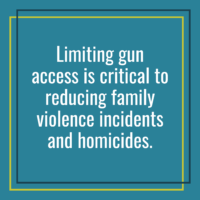
Mosaic takes its commitment to protecting the safety of survivors of abuse very seriously.
Recently, the Fifth Circuit Court of Appeals ruled that people under a family violence protective order have a constitutional right to gun ownership. This ruling struck down the portion of a longstanding federal law that prohibited people subject to a civil protective order (also known as a civil restraining order in other states) from possessing firearms.
The Fifth Circuit’s ruling, which covers the states of Mississippi, Louisiana, and Texas, jeopardizes survivors’ rights to safety and their ability to obtain legally enforceable protections from their abusers. The ruling does not directly block the enforcement of Texas state law prohibiting abusers that are subject to a protective order from gun ownership. However, it has already impacted cases within the state as some judges have ruled that abusers, subject to a protective order, can keep their guns.
Survivors of family violence continue to face safety risks from their abusers and this ruling of the Fifth Circuit removes a life-saving legal protection. According to The National Network to End Domestic Violence, an average of three women in the U.S. are killed by a current or former partner every day; when a male abuser has access to a firearm, the risk that he will choose to shoot and kill a female partner increases by 1,000%. In the State of Texas, the Texas Council on Family Violence, estimates that over 70% of domestic violence homicide victims in Texas were killed with a firearm in 2021. The presence of a gun in a domestic violence situation increases the risk of homicide by 500%.
What is a Protective Order? A protective order can prevent an abuser from:
- hurting, threatening, or harassing an individual and/or their children;
- coming close to an individual or their family, home, workplace, or child’s daycare or school; and, or
- carrying a gun, even with a license*
* The 5th Circuit ruling may ultimately impact the legal protections this restriction provides.
In additional to protections against an abuser’s actions, a judge can also:
- order the separation of a cell phone number (including one used by a child) if the cell phone number is under/connected to the abuser’s account;
- order payment of child support and medical support;
- set terms and conditions for visitation with children;
- order an abuser to attend anger management classes or participate in a battering intervention and prevention program;
- order drug testing;
- order an abuser to attend a substance abuse treatment program;
- order an abuser out of the home (“kick out order”), and, or;
- order an abuser to do any specified act necessary or appropriate to prevent or reduce the likelihood of family violence.
Mosaic Family Services has decades of experience working with family violence survivors. Limiting gun access is critical to reducing family violence incidents and homicides. A protective order is one way that a family violence survivor can obtain protection from their abuser. We are concerned about the impact this ruling will have on protective orders, their effectiveness, and their enforceability.
Mosaic Family Services stands in solidarity with domestic violence survivors.
